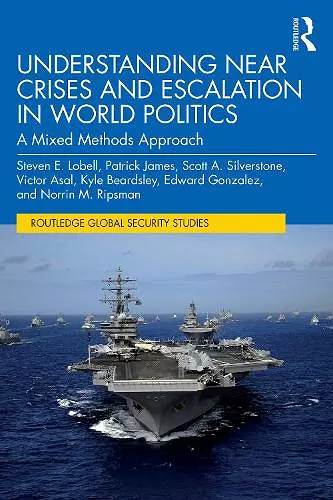Understanding Near Crises and Escalation in World Politics
A Mixed Methods Approach
Victor Asal author Patrick James author Edward Gonzalez author Norrin M Ripsman author Scott A Silverstone author Steven E Lobell author Kyle Beardsley author
Format:Paperback
Publisher:Taylor & Francis Ltd
Published:31st Jul '25
Should be back in stock very soon
This paperback is available in another edition too:
- Hardback£155.00(9781041007173)

This book introduces the near crisis phase of conflict and escalation.
These time-sensitive disputes between states, and even with violent non-state actors, do not involve significant risk of military escalation, at least in the moment. Investigating how and why some near crises escalate, while others do not, requires an explanation of the different dynamics of international disputes and the policy tools that states and international institutions can employ. We ask an expanded set of questions about specific cases and general patterns of conflict behavior, such as: why did Israeli leaders respond to Hezbollah’s 2006 cross-border raid with escalation, resulting in the Second Lebanon War, while in previous instances the Israelis limited their retaliation? Why didn’t the 2015 Iranian Ballistic Missile Test or the 1995 Norwegian Black Brant Missile Launch escalate, while the 2009 North Korea Missile Movement and the 1995 Taiwan Straits dispute tipped into a full-blown crisis, and why did the 2008 Russia-Georgia conflict escalate from near crisis to war? We use primary sources and newly created data on near crises to answer these questions and others. The overall conclusion is that an ounce of prevention at the near crisis phase is worth a pound of cure in averting a full-blown crisis or war.
This book will be of great interest to students of security studies, conflict studies, foreign policy, and international relations.
'Understanding Near Crises and Escalation in World Politics introduces the concept of "near crisis" to address a critical yet often overlooked issue: the policy decisions and actions taken in the prelude to crises or military escalations. The framework offers a fresh perspective that equips policymakers, and scholars, with valuable tools to mitigate entanglements before they escalate into full crises.'
Juan E. Battaleme Martinez, Secretary for Argentinean Defense International Relations, Ministry of Defense
'Near crises occupy the space where confrontations in international crises can escalate or de-escalate. In this outstanding first book-length investigation of near crises in world politics, the systemist method for graphically conveying arguments is employed to provide insights for academics and practitioners who seek understanding of the escalation dynamic.'
Jonathan Wilkenfeld,Professor Emeritus of Government and Politics at the University of Maryland and Director of the ICONS simulation project
'Understanding Near Crises and Escalation in World Politics is an indispensable read for national security practitioners. They now have the tools to diagnose near-crises conditions and recognize possible catalysts for escalation toward crises and even war. How and when policymakers use instruments of power can make a difference in stabilizing a complex world.'
Sonya Finley, Colonel (Retired), Professor of Strategy, US National War College
'By focusing on why and how “near crises” escalate into full-blown conflicts, this book contributes to improving our collective understanding of escalation dynamics. These insights are important to both better prevent crises and conflicts and to strengthen deterrence. An important read for scholars and policy-makers alike.'
Benedetta Berti-Alberti,Director, Policy Planning, Office of the Secretary General, NATO
ISBN: 9781041007159
Dimensions: unknown
Weight: 310g
154 pages